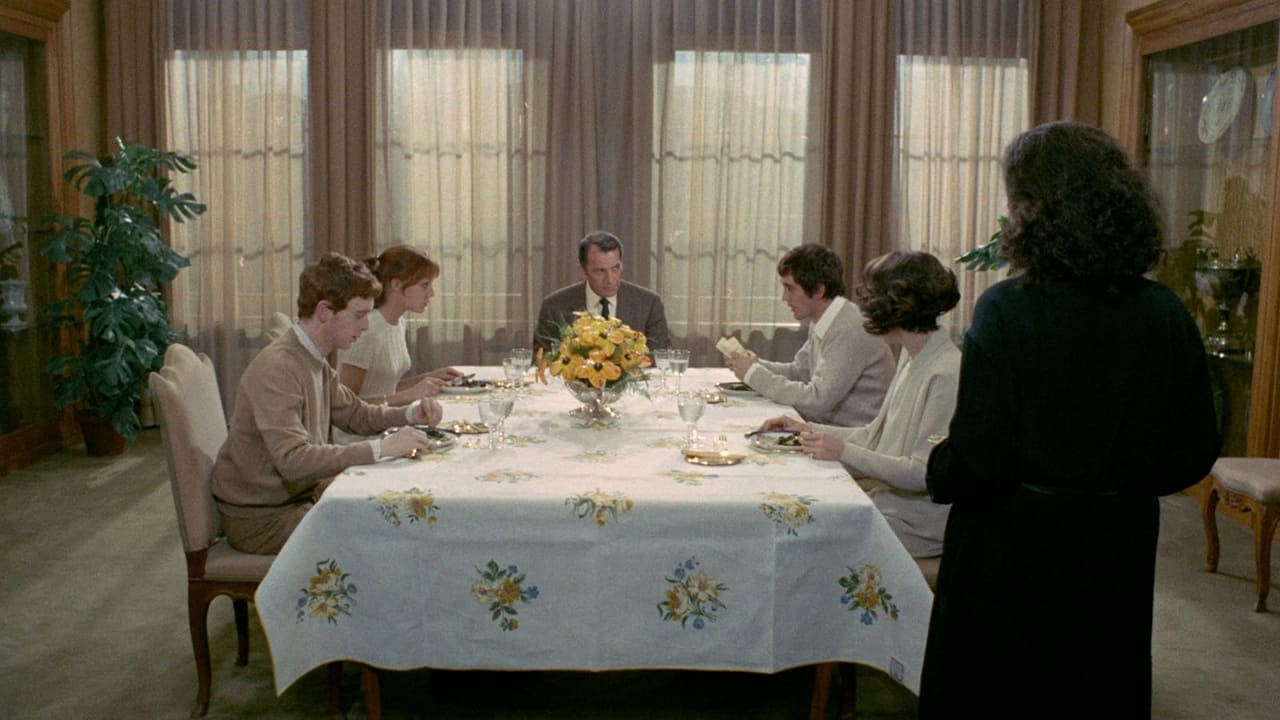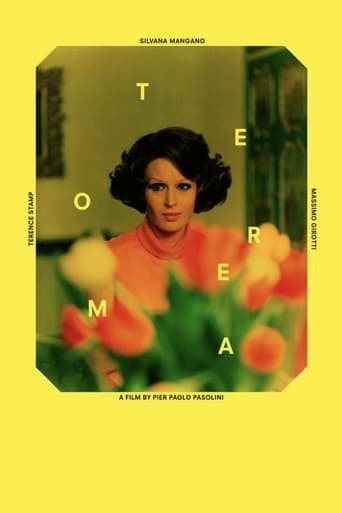

As always with Pasolini, we get clumsy acting, dialogue and camera work, though here the story is so important and vital that I've given it more stars than it aesthetically deserves. A stranger appears within a wealthy Italian family, is seduced/seduces each of them--old and young, women and men--and they are all changed by his (its) presence. Though Terence Stamp is perfect physically for the androgynous/bisexual angel, he is a bit adrift among Pasolini's amateurish melodramatic and kitschy handling of film-making. I recommend it ONLY for the brave and rare portrayal of Connection/Love as genderless
... View MoreWatching Teorema for the first time in 2017 it gave me a chill by the influence this movie clearly had on one of my favorite films of all time "Apartment Zero" (1988) - I know "Apartment Zero" so well that at times it felt (felt is the operative word)I was in their same universe. They are both socio-political psycho sexual tales. Terence Stamp and Hart Bochner even look related to each other. Colin Firth represents a Country in decadence with a past of elegant pride, Massimo Girotti represents, for me, exactly the same things for different reasons in different ways but they are both seduceable in the eyes of the stranger. To think that Teorema was made in 1968 and Apartment Zero in 1988, boggles the mind. Mine anyway.
... View MoreThe bourgeoisie have long been a target for many of the great European film-makers. They were an object of fascination and humour for Luis Bunuel and were often portrayed as outwardly repulsive by Rainer Werner Fassbinder and Jean-Luc Godard. In Theorem, Pier Paolo Pasolini ponders whether they are beyond hope and redemption, so far removed from our society that they are now of a different species altogether. The film begins outside of a factory, where the workers gather outside trying to understand why the owner has fled, leaving the entire company in the hands of its employees. They seem angry while a news reporter tries to comprehend the situation.In an upper-class Milan suburb, a wealthy family are informed of the imminent arrival of a stranger by a enthusiastic postman. The man, known only as the Visitor (Terence Stamp), suddenly appears at their home seemingly without reason, and immediately begins to affect the family and their maid. He stops the maid (Laura Betti) from committing suicide, soothes the son (Andres Jose Cruz Soblette) of his anxieties, eases the fears of the opposite sex of the daughter (Anne Wiazemsky), seduces the sexually repressed mother (Silvana Mangano), and nurses the seriously ill father (Massimo Girotti) back to health. He vanishes as quickly as he appeared, leaving his subjects in various states of bewilderment and enlightenment.Is the man God, the devil, or both? Ultimately, this question doesn't really matter. It's clear that the Stranger is a divine presence, but it's the effect he has on the unwitting family that is the most fascinating. The maid, a humble woman of low birth, returns to her village and is worshipped as a saint, and even appears to levitate at one point. The bourgeoisie family, however, start to slowly implode, climaxing with the father stripping himself naked and wandering into a desolate land. The Visitor seems to unlock their potential, only they - the maid aside - are unable to handle such divinity brought to them on a human level. The final scene includes a scream that may be ecstasy or pure terror, but Theorem doesn't make it that easy to unravel. This is a complex and fascinating work by one of the Italian masters, and one that will have you trying to pull apart its themes days after you have watched it.
... View MoreSomeone said you should look at your mood before rating this film. I had to walk an unnecessary kilometre to buy my ticket, someone was using a cellphone during the credits, and the WHOLE film was shown in a too-wide aspect ratio - after I had alerted the organisers, having seen the problem while watching the splash-page, over and over. (It was shown rather dimly off a DVD.) So I have to give the film a huge discount for my grumpiness.I didn't like it. I don't despise it, because I think Pasolini was sincere in making it, not trying to put one over us with pretentious piffle (cf Fellini). It's certainly not the worst film ever made, not dishonest, condescending or manipulative, just slow, opaque and uninvolving (but maybe the last is just me; see above).My (and most people's?) disconnect from Teorema is that we can no longer identify with the Italian Catholic guilt that overcame most of the family after succumbing to Terence Stamp's undoubted charms. He had sex with them (usually at their instigation - to say "he seduced them" is to exaggerate wildly) and a reaction is to be expected, but catatonia? Levitation and autointerment? Bad art? (OK, bad art.) And is there really a volcanic desert handy to the Milan (?) railway station that anyone can walk to naked without being intercepted?So when it (finally!) said "FINE" I said "Fine by me."
... View More